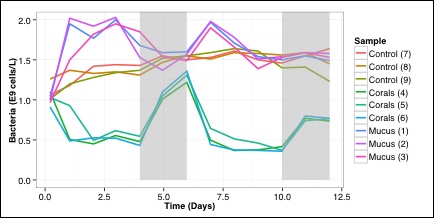Corals' Influence on Reef Microbes
Study Reveals Corals' Influence on Reef Microbes (from WHOI press release)
As they grow, corals are bathed in a sea of marine microbes, such as bacteria, algae, and viruses. While these extremely abundant and tiny microorganisms influence coral communities in a variety of ways, a new study by researchers at the Woods Hole Oceanographic Institution (WHOI), the Bermuda Institute of Ocean Sciences (BIOS) and University of California, Santa Barbara (UCSB) reveals that corals also have an impact on the microbes in waters surrounding them.
In novel lab observations of interactions between corals and planktonic bacteria, known as picoplankton, researchers found that corals are selectively feeding on specific types of bacteria—the same bacteria whose growth is promoted by organic matter and nutrients that are released by the corals.
Corals secrete a protective surface layer of mucus, which also support an active community of microbes. In order to better understand how corals and coral mucus might be interacting with microbes in surrounding reef waters, Amy Apprill (WHOI), and her colleagues Sean McNally and Rachel Parsons at BIOS, set up aquaria-based experiments using colonies of the coral P. astreoides obtained from three Bermudian reefs.
When corals were put in the tanks, the microbes in the sea water were drastically reduced in numbers. The corals were selectively feeding on several types of bacteria— Rhodobacteraceae, Synechococcus, and SAR11, which are most abundant groups of bacteria in the ocean. When the corals were removed from the sea water tanks, there was a strong increase in these microbes.

Overall, bacterioplankton abundance decreased in response to coral additions and returned to control tank levels when corals were removed (Days 5-6 and Days 11-12).
The increase was partially a result of the microbes replenishing themselves since the corals were no longer feeding on them but the team also observed something surprising: extremely fast rates of microbial growth. This suggests that the microbes are growing on something that the corals leave behind in the tank. This study shows that corals do in fact influence the picoplankton community by selecting specific lineages of picoplankton for removal and also by potentially using the complex carbon compounds excreted by the coral to promote the growth of these lineages.
Coral reefs, which support diverse communities of fish and other marine life, are declining globally at unprecedented rates due to human-caused impacts, such as warming waters and ocean acidification. Researchers say that there is an urgent need to uncover how specific coral picoplankton interactions contribute to these threatened ecosystems.
Funding for this project was provided by the National Science Foundation, the Dalio Explore Fund, and a grant in aid from the Bermuda Institute of Ocean Sciences.
McNally, S.P., Parsons, R.J., Santoro, A.E., and Apprill, A. (2017). Multifaceted impacts of the stony coral Porites astreoides on picoplankton abundance and community composition. Limnology and Oceanography 62, 217-234. DOI: 10.1002/lno.10389
Project Contact
Rachel Parsons
Research Specialist, Microbial Ecology Laboratory
Rachel.Parsons@bios.edu
